Intro
Discover what causes canker sores, symptoms, and treatments. Learn about mouth ulcers, oral health, and remedies to alleviate pain and promote healing from these painful lesions.
Canker sores, also known as aphthous ulcers, are small, shallow lesions that develop on the soft tissues in the mouth, such as the tongue, inner cheeks, lips, and throat. They are typically round or oval in shape and can be painful, making eating, drinking, and talking uncomfortable. Canker sores are not contagious and are different from cold sores, which are caused by the herpes simplex virus.
Canker sores can affect anyone, regardless of age, gender, or health status. However, they are more common in women, especially during their reproductive years. The exact cause of canker sores is still unknown, but several factors can trigger their development, including stress, hormonal changes, food allergies, and nutritional deficiencies. Some people may also be more prone to canker sores due to their genetic predisposition.
The symptoms of canker sores can vary from person to person, but they typically start with a tingling or burning sensation in the affected area, followed by the appearance of a small, red spot or bump. The sore can then rupture and form a crater-like lesion, which can be painful and sensitive to touch. In some cases, canker sores can be accompanied by fever, swollen lymph nodes, and fatigue. While canker sores can be uncomfortable and painful, they are usually not a cause for concern and can be managed with self-care measures and over-the-counter treatments.
Types of Canker Sores
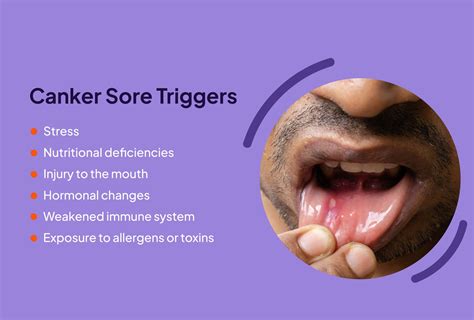
There are several types of canker sores, including minor, major, and herpetiform aphthous ulcers. Minor canker sores are the most common type and are typically small, round, and shallow. They can appear alone or in clusters and usually heal within 1-2 weeks without leaving any scars. Major canker sores are larger and deeper than minor canker sores and can take longer to heal. They can also leave scars and are more painful. Herpetiform aphthous ulcers are a rare type of canker sore that appears as a cluster of small, pinpoint lesions. They can be extremely painful and may take longer to heal.
Canker Sore Triggers
Canker sores can be triggered by a variety of factors, including stress, hormonal changes, food allergies, and nutritional deficiencies. Some people may also be more prone to canker sores due to their genetic predisposition. Other triggers can include minor mouth injury, such as biting the tongue or cheek, and certain medications, such as beta-blockers and NSAIDs. Food sensitivities, especially to acidic or spicy foods, can also trigger canker sores in some people.Canker Sore Symptoms
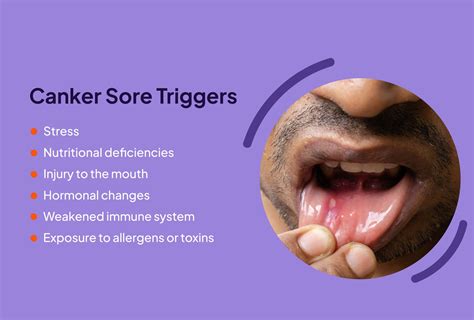
The symptoms of canker sores can vary from person to person, but they typically start with a tingling or burning sensation in the affected area, followed by the appearance of a small, red spot or bump. The sore can then rupture and form a crater-like lesion, which can be painful and sensitive to touch. In some cases, canker sores can be accompanied by fever, swollen lymph nodes, and fatigue. The pain from canker sores can be sharp and stabbing, especially when eating or drinking acidic or spicy foods.
Canker Sore Diagnosis
Canker sores are usually diagnosed based on their appearance and symptoms. A healthcare provider may perform a physical examination and take a complete medical history to rule out other conditions that may be causing the symptoms. In some cases, a biopsy may be necessary to confirm the diagnosis. A biopsy involves removing a small sample of tissue from the affected area and examining it under a microscope.Canker Sore Treatment
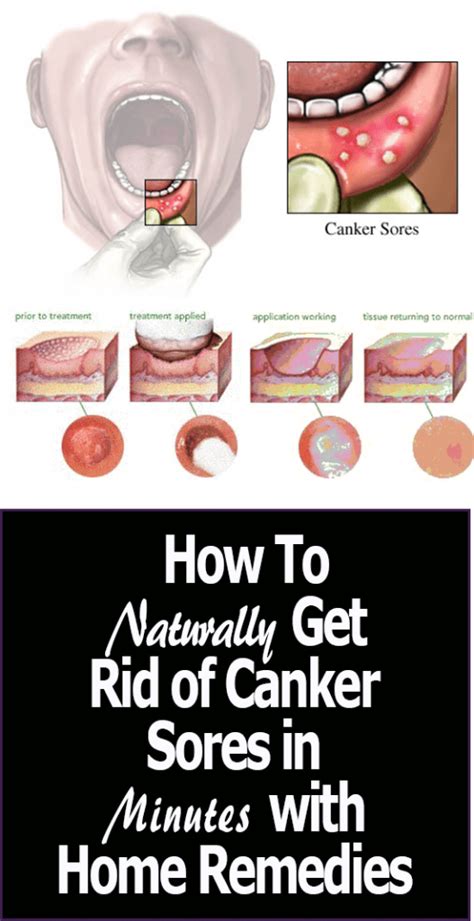
While canker sores can be painful and uncomfortable, they can be managed with self-care measures and over-the-counter treatments. Topical anesthetics, such as benzocaine or lidocaine, can help numb the area and reduce pain. Anti-inflammatory medications, such as ibuprofen or acetaminophen, can help reduce swelling and pain. Desensitizing toothpaste can also help reduce sensitivity in the affected area.
Canker Sore Home Remedies
There are several home remedies that can help soothe and heal canker sores, including saltwater rinses, baking soda paste, and aloe vera gel. Saltwater rinses can help reduce swelling and kill bacteria in the affected area. Baking soda paste can help neutralize acid in the mouth and reduce inflammation. Aloe vera gel can help soothe and calm the affected area, reducing pain and inflammation.Canker Sore Prevention
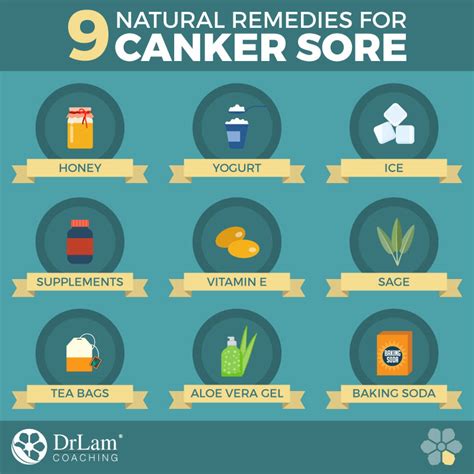
While canker sores can be unpredictable, there are several steps that can be taken to reduce the risk of developing them. Avoiding trigger foods, such as acidic or spicy foods, can help reduce the risk of canker sores. Practicing good oral hygiene, including brushing and flossing regularly, can also help reduce the risk of canker sores. Reducing stress through relaxation techniques, such as meditation or deep breathing, can also help reduce the risk of canker sores.
Canker Sore Complications
In rare cases, canker sores can lead to complications, such as infection, scarring, and nutritional deficiencies. Infection can occur if the sore becomes infected with bacteria, which can lead to more serious health problems. Scarring can occur if the sore is deep or large, which can leave a permanent scar. Nutritional deficiencies can occur if the sore makes eating or drinking uncomfortable, leading to inadequate nutrition.Canker Sore and Nutrition
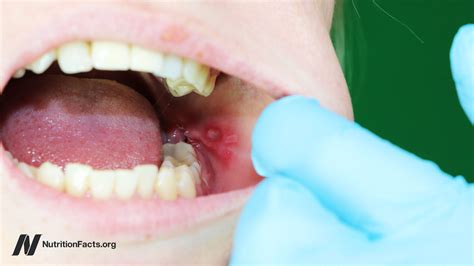
A healthy diet rich in fruits, vegetables, and whole grains can help reduce the risk of canker sores. Foods that are high in antioxidants, such as vitamins C and E, can help reduce inflammation and promote healing. Foods that are high in fiber, such as whole grains and legumes, can help reduce inflammation and promote healing. Avoiding trigger foods, such as acidic or spicy foods, can also help reduce the risk of canker sores.
Canker Sore and Stress
Stress can trigger canker sores in some people, especially during times of high stress or anxiety. Practicing relaxation techniques, such as meditation or deep breathing, can help reduce stress and promote healing. Exercise, such as yoga or walking, can also help reduce stress and promote healing. Getting enough sleep, aiming for 7-8 hours per night, can also help reduce stress and promote healing.Canker Sore and Oral Health
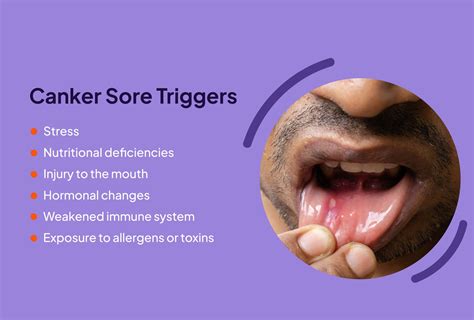
Practicing good oral hygiene, including brushing and flossing regularly, can help reduce the risk of canker sores. Regular dental check-ups can also help identify and treat any underlying oral health issues that may be contributing to canker sores. Avoiding tobacco products, including cigarettes and chewing tobacco, can also help reduce the risk of canker sores.
Canker Sore and Genetics
Genetics can play a role in the development of canker sores, especially in people who have a family history of the condition. While there is no cure for canker sores, there are several steps that can be taken to reduce the risk of developing them. Practicing good oral hygiene, avoiding trigger foods, and reducing stress can all help reduce the risk of canker sores.What are canker sores?
+Canker sores, also known as aphthous ulcers, are small, shallow lesions that develop on the soft tissues in the mouth.
What causes canker sores?
+The exact cause of canker sores is still unknown, but several factors can trigger their development, including stress, hormonal changes, food allergies, and nutritional deficiencies.
How are canker sores treated?
+Canker sores can be managed with self-care measures and over-the-counter treatments, including topical anesthetics, anti-inflammatory medications, and desensitizing toothpaste.
If you have canker sores, it's essential to take steps to manage your symptoms and prevent future outbreaks. By practicing good oral hygiene, avoiding trigger foods, and reducing stress, you can help reduce the risk of canker sores and promote healing. If you're experiencing frequent or severe canker sores, it's essential to talk to your healthcare provider about treatment options and prevention strategies. With the right treatment and self-care, you can manage your canker sores and maintain good oral health. We hope this article has been informative and helpful in understanding canker sores. Please feel free to share your thoughts and experiences in the comments section below.
